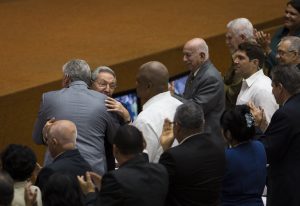Havana, Apr 18 (EFE).- Cuba’s current first vice president, Miguel Diaz-Canel, 57, on Wednesday was nominated by the island’s National Assembly to succeed 86-year-old President Raul Castro,who has served two terms but has said he will now step down.
Diaz-Canel’s official candidacy will now be submitted to a vote by the full Assembly, although the result will not be made public until Thursday morning.
After the proposal nominating Diaz-Canel to replace Castro was read, the 605 lawmakers gave the Cuban government’s “No. 2” official a prolonged round of applause.
The National Candidacy Commission (CCN) proposed Salvador Valdes Mesa, 72, to succeed Diaz-Canel as first vice president.

Valdes Mesa is a member of the Politburo of the Cuban Communist Party (PCC), the communist island’s only legal political party, and to date has occupied one of the Council of State’s five vice presidential posts.
If confirmed, Valdes Mesa will be Cuba’s first black first vice president, the highest political office ever attained by a person of his race in Cuba.
With the departure of both Castro and Vice President Jose Ramon Machado Ventura, 87, the only member of the generation that launched and won the Cuban Revolution still holding high office in Cuba’s Council of State will be Ramiro Valdes, who is 85.
Two of the five current proposed candidates for the five VP posts – Valdes and Gladys Bejerano – will continue in their posts.
Homero Acosta, also a member of the Central Committee of the PCC, has been nominated for re-election as secretary.
Of the 23 remaining members of the Council of State, 13 are new faces and 10 have served there for some time, including Armed Forces Minister Leopoldo Cintra Frias and cultural officials, such as Miguel Barnet, the president of the Union of Writers and Artists of Cuba (UNEAC).
Also continuing in their current posts will be Foreign Minister Bruno Rodriguez, youth leader Susely Morfa and the head of the powerful CTC union, Ulises Guilarte, all from the younger generation.
Lawmakers were given an hour to study the biographies of the candidates and, if they desire, to modify the list of proposed candidacies, as per regular Cuban electoral rules.
The National Election Commission will count the votes, which will be cast by secret ballot.
